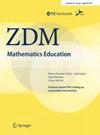Facing and challenging language ideologies towards a more inclusive understanding of language in mathematics education research—the case of sign languages
IF 2.4
2区 教育学
Q2 EDUCATION & EDUCATIONAL RESEARCH
引用次数: 0
Abstract
Abstract Research on language in mathematics education is largely dominated by a ‘normalcy’ of spoken languages. This modal hegemony does not only affect a whole group of learners in failing to provide access that is epistemologically equitable—those using sign language as their preferred mode for mathematical discourse—it also obscures our view on the roles language can play in mathematical thinking and learning. As a field, we can only win from seeking to understand Deaf learners of mathematics beyond a disability, as learners of mathematics with a specific linguistic background that influences mathematical thinking and learning in peculiar ways. In this contribution, I suggest a shift in mindset towards a more inclusive view on language in mathematics education research and practice. I propose basic principles to inform a perspective for reconsidering the role of language in mathematics thinking and learning, inspired by work of philosopher Francois Jullien. This perspective counters a perspective that merely integrates sign language into existing research and instead searches for dialogue between linguistic modalities in learning mathematics, looking beyond language as spoken or written. This approach will be illustrated by the case of the modal affordance of iconicity foregrounded in signed mathematical discourse, its role in Deaf students’ mathematics thinking and learning, and how this can inform existing research and practice dealing with language in mathematics education.

面对和挑战语言意识形态,在数学教育研究中实现对语言的更包容的理解——以手语为例
数学教育中的语言研究在很大程度上是以口语的“常态”为主导的。这种模式霸权不仅影响了整个学习者群体,因为他们无法提供认识论上公平的途径——那些使用手语作为数学话语首选模式的学习者——它还模糊了我们对语言在数学思维和学习中所起作用的看法。作为一个领域,我们只能通过寻求超越残疾的聋人数学学习者,作为具有特定语言背景的数学学习者,以特殊的方式影响数学思维和学习,才能取得胜利。在这篇文章中,我建议转变思维方式,以更包容的视角看待数学教育研究和实践中的语言。受哲学家弗朗索瓦·于连(Francois Jullien)的启发,我提出了一些基本原则,为重新考虑语言在数学思维和学习中的作用提供了一个视角。这一观点反驳了一种观点,即仅仅将手语纳入现有研究,而是寻找学习数学的语言模式之间的对话,超越口头或书面语言。在手语数学话语中,象似性的模态提供性在聋人学生的数学思维和学习中的作用,以及它如何为现有的数学教育语言研究和实践提供信息,这些都将说明这种方法。
本文章由计算机程序翻译,如有差异,请以英文原文为准。
求助全文
约1分钟内获得全文
求助全文
来源期刊

Zdm-Mathematics Education
EDUCATION & EDUCATIONAL RESEARCH-
CiteScore
6.40
自引率
10.00%
发文量
124
期刊介绍:
ZDM – Mathematics Education is one of the oldest mathematics education research journals. The papers appearing in the seven themed issues per year are strictly by invitation only followed by internal peer review by the guest-editors and external review by invited experts. The journal exists to survey, discuss and extend current research-based and theoretical perspectives as well as to create a forum for critical analyses of issues within mathematics education. The audience is pre-dominantly mathematics education researchers around the world interested in current developments in the field.
 求助内容:
求助内容: 应助结果提醒方式:
应助结果提醒方式:


